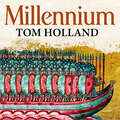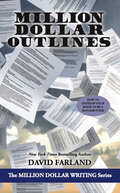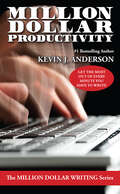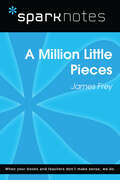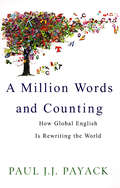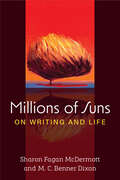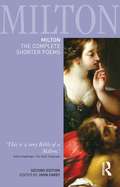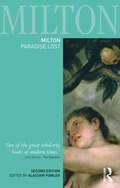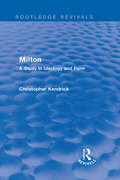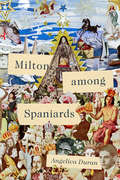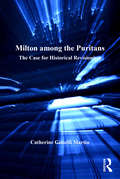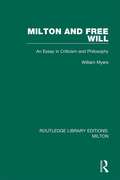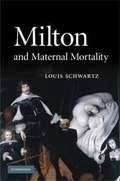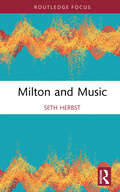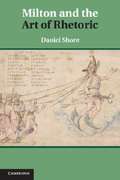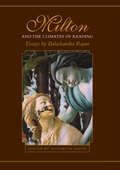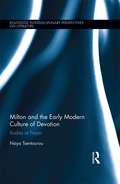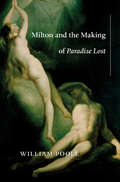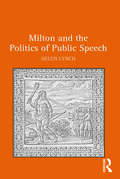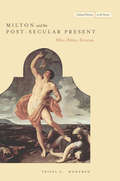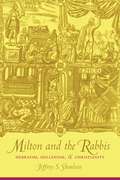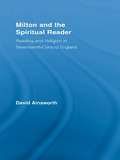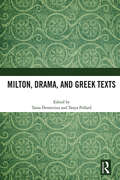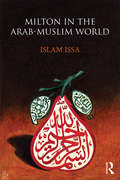- Table View
- List View
Millennium: The End of the World and the Forging of Christendom
by Tom HollandOf all the civilisations existing in the year 1000, that of Western Europe seemed the unlikeliest candidate for future greatness. Compared to the glittering empires of Byzantium or Islam, the splintered kingdoms on the edge of the Atlantic appeared impoverished, fearful and backward. But the anarchy of these years proved to be, not the portents of the end of the world, as many Christians had dreaded, but rather the birthpangs of a radically new order.MILLENNIUM is a stunning panoramic account of the two centuries on either side of the apocalyptic year 1000. This was the age of Canute, William the Conqueror and Pope Gregory VII, of Vikings, monks and serfs, of the earliest castles and the invention of knighthood, and of the primal conflict between church and state. The story of how the distinctive culture of Europe - restless, creative and dynamic - was forged from out of the convulsions of these extraordinary times is as fascinating and as momentous as any in history.
Million Dollar Outlines: 2013 Edition (Million Dollar Writing Series)
by David FarlandDiscover the secrets to crafting a successful novel in this guide by a master writer & instructor and New York Times–bestselling author. Bestselling author David Farland taught dozens of writers who went on to staggering literary success, including such #1 New York Times Bestsellers as Brandon Mull (Fablehaven), Brandon Sanderson (Wheel of Time), James Dashner (The Maze Runner) and Stephenie Mayer (Twilight). In this book, Dave teaches how to analyze an audience and outline a novel to appeal to a wide readership. The secrets found in his unconventional approach will help you understand why so many of his authors went on to prominence. Hailed as &“the wizard of storytelling,&” Dave was an award-winning, international best-selling author with more than fifty novels in print, and a tireless mentor and instructor of new writers. His book Million Dollar Outlines is a seminal work teaching authors how to create a blueprint for a novel that can lead to bestseller success.
Million Dollar Productivity (Million Dollar Writing Series)
by Kevin J. AndersonHow do you find time to write in a world of distractions? Get answers from a New York Times–bestselling author with more than 125 published novels! Life is crazy and hectic for most of us. We&’re surrounded with personal and family obligations, jobs, fitness programs, virtual mountains of email, not to mention videogames, TV, smartphones, social networking, and millions of things to check out on the web. With all those distractions, how does an aspiring author find time to write? And when you do find the time, how do you make the most of it? Award-winning and #1 international bestselling author Kevin J. Anderson is one of the most prolific authors in the business. He has published over 125 novels—an average of five novels a year, every year, for the past quarter century. Anderson has taught numerous writing seminars and lectured on productivity, and here he shares his tips on how to find the time to write, and how to make the most of that time.
A Million Little Pieces (SparkNotes Literature Guide Series)
by SparkNotesA Million Little Pieces (SparkNotes Literature Guide) by James Frey Making the reading experience fun! Created by Harvard students for students everywhere, SparkNotes is a new breed of study guide: smarter, better, faster. Geared to what today's students need to know, SparkNotes provides: *Chapter-by-chapter analysis *Explanations of key themes, motifs, and symbols *A review quiz and essay topicsLively and accessible, these guides are perfect for late-night studying and writing papers
A Million Words And Counting: How Global English Is Rewriting The World
by Payack Paul J.From Babel to Babble . . . Everyone is Speaking English In 2007, the English language passed the million-word mark. That shouldn't come as a surprise since over a billion Earthlings speak English (no one knows about other planets, but they probably speak it, too). That makes for a lot of word-coiners (neologists) out there. And where are all these new words coming from? Hollywood? Technology? The Internet? Corporate boardrooms? Youthspeak? How do world events--from tsunamis and hurricanes to political doublespeak and presidential linguistic bumbling--influence the words we use on a daily basis? What do e-mails, text messages, and emoticons contribute to the language? Let WordMan Paul J. J. Payack take you on a global tour of English-speaking worlds--virtual and otherwise: From India, Singapore, and China, to Australia, the U. S. and the U. K. From film, television, fashion, music, politics, sports, games, business, technology and science From TV junkies, fashionistas and sports fans, to amateur historians and linguists And from every other source that contributes to the global tapestry of English Get ready for a whirlwind tour of our increasingly global culture and how it becomes that way. A Million Words? Fundoo! Podcast, Chinglish, truthiness, crunk. Just a year or two ago, these words were gibberish to most English speakers. Today they pop up in everyday conversation worldwide, just four of the ten thousand new words added to the English language every year. Spurred by the universality of the Internet--where it is the de facto lingua franca--and the global reach of its media, English is growing at a rate unprecedented in its 1500-year history. Indeed, in the spring of 2007, the English word count surpassed a million--over ten times the number available in French. At the crest of this linguistic tsunami surfs Paul J. J. Payack, aka the WordMan. As president of the Global Language Monitor, he has tracked the latest developments--the fascinating hybrids, the bizarre etymologies, the lasting malapropisms--in the language shared by two billion of the Earth's citizens. Aided by a worldwide network of similarly obsessed language mavens and armed with his own powerful word-counting algorithm, Payack ensures that no new English word falls from the tongue or marks the page without being counted toward the Million Word March. A Million Words and Counting is a celebration of the vast variety and ever-evolving expressiveness of humanity's most universal language. Fun and informative, this guide is a joyful exploration of English as it spreads across the globe, as it is spoken today, and as it expands into the future. Each entertaining chapter of this ambitious linguistic survey examines another source of new English, including Hollywood, youth culture, other languages, corporate boardrooms, and tongue-tied presidents. An engaging compendium of English-language facts and factoids, this is a trivia lover's goldmine and a logophile's playground.
Millions of Suns: On Writing and Life (Writers On Writing)
by M.C. Benner Dixon Sharon McDermottMillions of Suns is an open invitation for all writers to create something new. Each chapter features a pair of essays-in-dialogue between two working artists, Sharon Fagan McDermott and M. C. Benner Dixon, which addresses a specific writing element such as metaphor, inspiration, place, surprise, or imagery. These hybrid essays reveal how two very different writers approach the building blocks of their craft. Explore how white space intersects with grief, how the act of reading changes over a lifetime, or how “familiarity, in life and in stories, invites us in and gives us a hand to hold.” Witness the ways that race and climate change find their way onto the page. Learn how memory can be an act of betrayal or healing. With decades of combined teaching experience, McDermott and Benner Dixon share practical craft-of-writing advice with the reader, including over fifty engaging writing prompts to spark the creative process. These prompts guide readers toward the freedom and joy that comes with finding one’s authentic voice. Embracing both the painful and the playful, Millions of Suns is an ideal text for classrooms, professional development, or daily writing practice. Through humor, lyricism, and poignancy, the fundamental message of the book remains the same for newcomers and career authors. Let Millions of Suns open a door for you into your creative work, inviting imagination, memory, and inspiration into your writing life.
Milosz: A Biography
by Andrzej FranaszekAndrzej Franaszek’s award-winning biography of Czeslaw Milosz—winner of the Nobel Prize in Literature—recounts the poet’s odyssey through WWI, the Bolshevik revolution, the Nazi invasion of Poland, and the USSR’s postwar dominance of Eastern Europe. This edition contains a new introduction by the translators, along with maps and a chronology.
Milton: Complete Shorter Poems (Longman Annotated English Poets Ser.)
by John CareyThis masterly edition contains all of Milton's English poems, with the exception of Paradise Lost, together with translations and texts of all his Latin, Italian and Greek poems. First published in 1968 - and substantially updated in 1996 - John Carey's edition has, with Alastair Fowler's Paradise Lost, established itself as the pre-eminent edition of Milton's poetry, both for the student and the general reader. Hailed as 'a very Bible of a Milton', the extensive notes and headnotes serve to illuminate the wealth of Milton's allusions and to synthesize the judgements and disagreements of a bewildering array of modern critics. Each headnote sets out details of composition and context which will deepen any reader's appreciation of the poetry, while also providing a concise overview of the critical and scholarly debates that continue to flame around the work of one of the greatest poets in the English language. Steeped in learning though it undoubtedly is, it is also an unfailing light to those who wish to plot their own path through the dazzling riches of Milton's imagination.
Milton: Paradise Lost (Longman Annotated English Poets)
by Alastair FowlerMilton's Paradise Lost is one of the great works of literature, of any time and in any language. Marked by Milton's characteristic erudition it is a work epic both in scale and, notoriously, in ambition. For nearly 350 years it has held generation upon generation of scholars, students and readers in rapt attention and its profound influence can be seen in almost every corner of Western culture. First published in 1968, with John Carey's Complete Shorter Poems, Alastair Fowler's Paradise Lost is widely acknowledged to be the most authoritative edition of this compelling work. An unprecedented amount of detailed annotation accompanies the full text of the first (1667) edition, providing a wealth of contextual information to enrich and enhance the reader's experience. Notes on composition and context are combined with a clear explication of the multitude allusions Milton called to the poem's aid. The notes also summarise and illuminate the vast body of critical attention the poem has attracted, synthesizing the ancient and the modern to provide a comprehensive account both of the poem's development and its reception. Meanwhile, Alastair Fowler's invigorating introduction surveys the whole poem and looks in detail at such matters as Milton's theology, metrical structure and, most valuably, his complex and imaginary astronomy. The result is an enduring landmark in the field of Milton scholarship and an invaluable guide for readers of all levels.
Milton: A Study in Ideology and Form (Routledge Revivals)
by Christopher KendrickFirst published in 1986, this title critiques the canonical view of Milton as an isolated Great Man, and reassesses the impact of the Puritan Revolution on two of his major works: the Areopagitica and Paradise Lost. The study focuses on the emergence of a discreet ethical framework of thought within the dominant theological code of these two works, arguing that this framework – integral to Protestantism – is also crucial to the construction of subjectivity under capitalism. Through an analysis of the rhetorical strategies of the Areopagitica and the generic composition of Paradise Lost, Christopher Kendrick demonstrates that Milton’s ‘individualism’ both affirms the success of the Puritan Revolution and also exposes the contradictions between the capitalist subject’s ethical freedom and the world of necessity of which that freedom is part.
Milton among Spaniards (Early Modern Exchange)
by Angelica DuranFirmly grounded in literary studies but drawing on religious studies, translation studies, drama, and visual art, Milton among Spaniards is the first book-length exploration of the afterlife of John Milton in Spanish culture, illuminating underexamined Anglo-Hispanic cultural relations. This study calls attention to a series of powerful engagements by Spaniards with Milton’s works and legend, following a general chronology from the eighteenth to the early twenty-first century, tracing the overall story of Milton’s presence from indices of prohibited works during the Inquisition, through the many Spanish translations of Paradise Lost, to the author’s depiction on stage in the nineteenth-century play Milton, and finally to the representation of Paradise Lost by Spanish visual artists.
Milton among the Puritans: The Case for Historical Revisionism
by Catherine Gimelli MartinSolidly grounded in Milton's prose works and the long history of Milton scholarship, Milton among the Puritans: The Case for Historical Revisionism challenges many received ideas about Milton's brand of Christianity, philosophy, and poetry. It does so chiefly by retracing his history as a great "Puritan poet" and reexamining the surprisingly tenuous Whig paradigm upon which this history has been built. Catherine Martin not only questions the current habit of "lumping" Milton with the religious Puritans but agrees with a long line of literary scholars who find his values and lifestyle markedly inconsistent with their beliefs and practices. Pursuing this argument, Martin carefully reexamines the whole spectrum of seventeenth-century English Puritanism from the standpoint of the most recent and respected scholarship on the subject. Martin also explores other, more secular sources of Milton's thought, including his Baconianism, his Christian Stoic ethics, and his classical republicanism; she establishes the importance of these influences through numerous direct references, silent but clear citations, and typical tropes. All in all, Milton among the Puritans presents a radical reassessment of Milton's religious identity; it shows that many received ideas about the "Puritan Milton" are neither as long-established as most scholars believe nor as historically defensible as most literary critics still assume, and resituates Milton's great poems in the period when they were written, the Restoration.
Milton and Free Will: An Essay in Criticism and Philosophy (Routledge Library Editions: Milton #7)
by William MyersFirst published in 1987. Milton and Free Will is an incisive, ambitious and comprehensive analysis and defence of the concept of free will, using Milton as an example and exemplar. Written with passion, and out of a lifelong engagement with the poetry of Milton and the philosophical and theological problems it encompasses, the book will illuminate both Milton studies and philosophical debate. The author engages with all the major currents of the free will debate, starting with Aristotle and Aquinas and considering arguments advanced by Hume and Kant as well as those of a number of modern philosophers including Polanyi, Kenny, Parfit, Plantinga, Swinburne, Dennett and Davidson. He pays particular attention to the Marxist formalism of Bakhtin, the Catholic phenomenology of Pope John Paul II and the evolutionism of Monod and Sober. He concludes with a rebuttal of the deconstructionism of Barthes, Derrida and Foucault. He claims that all the major difficulties faced by defenders of free will can be overcome if a notion of willing implicit in the work of Milton is properly understood. Freedom as Milton represented and understood it, he suggests, is a condition of mind arising out of inter-personal awareness and not a property or consequence of practical reasoning. He finds supporting evidence for this view in the writings of Newman and in Henry James’s The Portrait of a Lady, which he reads as a narrative structurally reversing Milton’s representation of the fall of Eve in Paradise Lost. The author systematically analyses and reanalyses key passages in his texts in the light of the many arguments for and against free will, seeking thereby to affirm the validity in principle, and the personal and political importance in practice, of the Christian humanist tradition of which he sees Milton, Newman and the Pope as important (if sometimes misleading) spokesmen.
Milton and Maternal Mortality
by Louis SchwartzAll too often, childbirth in early modern England was associated with fear, suffering and death, and this melancholy preoccupation weighed heavily on the seventeenth-century mind. This landmark study examines John Milton's life and work, uncovering evidence of the poet's engagement with maternal mortality and the dilemmas it presented. Drawing on both literary scholarship and up-to-date historical research, Louis Schwartz provides important new readings of Milton's poetry, including Paradise Lost, as well as a wide-ranging survey of the medical practices and religious beliefs that surrounded the perils of childbirth. The reader is granted a richer understanding of how seventeenth-century society struggled to come to terms with its fears, and how one of its most important poets gave voice to that struggle.
Milton and Music (Routledge Focus on Literature)
by Seth HerbstMilton and Music is the first study to juxtapose John Milton’s poetry on music with later musical adaptations of his work. In Part I: Milton on Music, Seth Herbst shows that writing about music galvanized Milton’s intellectual development towards animist materialism, the belief that everything in the universe—even the human soul—is made of matter. The Milton who emerges is a forward-thinking visionary who leaped past his contemporaries in conceiving music as a material phenomenon that exists simultaneously as sound and metaphor. Part II: Milton in Music follows two daring composers in investigating whether Milton’s visionary concept of music can be realized in actual musical sound. In Samson, an oratorio adaptation of Milton’s Samson Agonistes, Handel resists Miltonic music theory, suggesting that music struggles to function as both sound and metaphor. By contrast, the twentieth-century Polish composer Krzysztof Penderecki composes an iconoclastic opera of Paradise Lost that develops a soundworld of fractured dissonance in which music acts as both sound and metaphor. Recovering Milton’s own high estimation of music from a critical tradition that has subordinated it to the poet’s political and religious convictions, Herbst reveals Milton as an interdisciplinary thinker and overlooked figure in the study of words and music. Driven by bold claims about the comparative treatment of literature and music, Milton and Music revises our understanding of what makes this canonical poet an intellectual revolutionary.
Milton and the Art of Rhetoric
by Daniel ShoreChallenging the conventional view of John Milton as an iconoclast who spoke only to a 'fit audience though few', Daniel Shore argues that Milton was a far more pragmatic writer than previous scholarship has recognized. Summoning evidence from nearly all of his works - poetry and prose alike - Shore asserts that Milton distanced himself from the prescriptions of classical rhetoric to develop new means of persuasion suited to an age distrustful of traditional eloquence. Shore demonstrates that Milton's renunciation of agency, audience, purpose and effect in the prose tracts leads not to quietism or withdrawal, but rather to a reasserted investment in public debate. Shore reveals a writer who is committed to persuasion and yet profoundly critical of his own persuasive strategies. An innovative contribution to the field, this text will appeal to scholars of Milton, seventeenth-century literature, Renaissance literature and the history and theory of rhetoric.
Milton and the Climates of Reading
by Elizabeth Sauer Balachandra RajanScholarly criticism of John Milton's writings has in recent decades been distinguished by a methodological prudence that separates it from other forms of literary scholarship. One critic, however, stands apart from his colleagues and has consistently offered a corrective to this prudence: Balachandra Rajan. In Milton and the Climates of Reading, Elizabeth Sauer undertakes the daunting work of bringing together a selection of Rajan's essays on Milton, some hitherto unpublished, in order to chart trends and changes in Milton scholarship over the last sixty years and to consider future directions in this vital field of inquiry.This collection, which is framed by Sauer's insightful introduction and an eloquent afterword by Joseph Wittreich, demonstrates Rajan's critical range and his ability to adapt to 'new' ideas, always reformulating them in his own characteristic and individual manner. Milton and the Climates of Reading offers timely statements about the ways in which Milton's writings not only addressed their own time, but also speak profoundly and powerfully to ours.
Milton and the Early Modern Culture of Devotion: Bodies at Prayer (Routledge Interdisciplinary Perspectives on Literature)
by Naya TsentourouMiton and Early Modern Devotional Culture analyses the representation of public and private prayer in John Milton’s poetry and prose, paying particular attention to the ways seventeenth-century prayer is imagined as embodied in sounds, gestures, postures, and emotional responses. Naya Tsentourou demonstrates Milton’s profound engagement with prayer, and how this is driven by a consistent and ardent effort to experience one’s address to God as inclusive of body and spirit and as loaded with affective potential. The book aims to become the first interdisciplinary study to show how Milton participates in and challenges early modern debates about authentic and insincere worship in public, set and spontaneous prayers in private, and gesture and voice in devotion.
Milton and the Making of Paradise Lost
by William Poole&“An authoritative, and accessible, introduction to Milton&’s life and an engaging examination of the process of composing Paradise Lost&” (Choice). In early 1642 Milton promised English readers a work of literature so great that &“they should not willingly let it die.&” Twenty-five years later, the epic poem Paradise Lost appeared in print. In the interim, however, the poet had gone totally blind and had also become a controversial public figure―a man who had argued for the abolition of bishops, freedom of the press, the right to divorce, and the prerogative of a nation to depose and put to death an unsatisfactory ruler. These views had rendered him an outcast. William Poole devotes particular attention to Milton&’s personal life: his reading and education, his ambitions and anxieties, and the way he presented himself to the world. Although always a poet first, Milton was also a theologian and civil servant, vocations that informed the composition of his masterpiece. At the emotional center of this narrative is the astounding fact that Milton lost his sight in 1652. How did a blind man compose this intensely visual work? Poole opens up the world of Milton&’s masterpiece to modern readers, first by exploring Milton&’s life and intellectual preoccupations and then by explaining the poem itself―its structure, content, and meaning. &“Poole&’s book may well become what he shows Paradise Lost soon became: a classic.&” —Times Literary Supplement &“Smart and original . . . Demonstrates with astonishing exactitude how Milton&’s life and―most impressively of all―his reading enabled this epic.&” ―The Spectator &“This deeply learned and lucidly written book . . . makes this most ambitious of early modern poets accessible to his modern readers.&” ―Journal of British Studies
Milton and the Politics of Public Speech
by Helen LynchUsing Hannah Arendt’s account of the Greek polis to explain Milton’s fascination with the idea of public speech, this study reveals what is distinctive about his conception of a godly, republican oratory and poetics. The book shows how Milton uses rhetorical theory - its ideas, techniques and image patterns - to dramatise the struggle between ’good’ and ’bad’ oratory, and to fashion his own model of divinely inspired public utterance. Connecting his polemical and imaginative writing in new ways, the book discusses the subliminal rhetoric at work in Milton’s political prose and the systematic scrutiny of the power of oratory in his major poetry. By setting Milton in the context of other Civil War polemicists, of classical political theory and its early modern reinterpretations, and of Renaissance writing on rhetoric and poetic language, the book sheds new light on his work across several genres, culminating in an extended Arendtian reading of his ’Greek’ drama Samson Agonistes.
Milton and the Post-Secular Present
by Feisal G. MohamedOur post-secular present, argues Feisal Mohamed, has much to learn from our pre-secular past. Through a consideration of poet and polemicist John Milton, this book explores current post-secularity, an emerging category that it seeks to clarify and critique. It examines ethical and political engagement grounded in belief, with particular reference to the thought of Alain Badiou, Jacques Derrida, Jürgen Habermas, and Gayatri C. Spivak. Taken to an extreme, such engagement produces the cult of the suicide bomber. But the suicide bomber has also served as a convenient bogey for those wishing to distract us from the violence in Western and Christian traditions and for those who would dismiss too easily the vigorous iconoclasm that belief can produce. More than any other poet, Milton alerts us to both anti-humane and liberationist aspects of belief and shows us relevant dynamics of language by which such commitment finds expression.
Milton and the Rabbis: Hebraism, Hellenism, and Christianity
by Jeffrey ShoulsonTaking as its starting point the long-standing characterization of Milton as a "Hebraic" writer, Milton and the Rabbis probes the limits of the relationship between the seventeenth-century English poet and polemicist and his Jewish antecedents. Shoulson's analysis moves back and forth between Milton's writings and Jewish writings of the first five centuries of the Common Era, collectively known as midrash. In exploring the historical and literary implications of these connections, Shoulson shows how Milton's text can inform a more nuanced reading of midrash just as midrash can offer new insights into Paradise Lost.Shoulson is unconvinced of a direct link between a specific collection of rabbinic writings and Milton's works. He argues that many of Milton's poetic ideas that parallel midrash are likely to have entered Christian discourse not only through early modern Christian Hebraicists but also through Protestant writers and preachers without special knowledge of Hebrew. At the heart of Shoulson's inquiry lies a fundamental question: When is an idea, a theme, or an emphasis distinctively Judaic or Hebraic and when is it Christian? The difficulty in answering such questions reveals and highlights the fluid interaction between ostensibly Jewish, Hellenistic, and Christian modes of thought not only during the early modern period but also early in time when rabbinic Judaism and Christianity began.
Milton and the Spiritual Reader: Reading and Religion in Seventeenth-Century England (Studies in Major Literary Authors)
by David AinsworthMilton and the Spiritual Reader considers how John Milton’s later works demonstrate the intensive struggle of spiritual reading. Milton presents his own rigorous process of reading in order to instruct his readers how to advance their spiritual knowledge. Recent studies of Milton’s readers neglect this spiritual dimension and focus on politics. Since Milton considers the individual soul at least as important as the body politic, Ainsworth focuses on uncovering the spiritual characteristics of the reader Milton tries to shape through his texts. He also examines Milton’s reading practices without postulating the existence of some ideal or universal reader, and without assuming a gullible or easily manipulated reader. Milton does not simply hope for a fit audience, but writes to nurture fit readers. His works offer models of strenuous and suspicious close reading, subjecting all authors except God to the utmost of scrutiny. Milton presents Biblical interpretation as an interior struggle, a contention not between reader and text, but within that reader’s individual understanding of scripture. Ainsworth’s study rethinks the basic relationship between reading and religion in seventeenth-century England, and concludes that for Milton and his contemporaries, distinguishing divine truths in worldly texts required a spiritually guided form of close reading.
Milton, Drama, and Greek Texts
by Tania Demetriou Tanya PollardThis collection reconsiders Milton’s engagement with Greek texts, with particular attention to the theological and theatrical meanings attached to Greek in the early modern period. Responding to new scholarship on early modern reactions to Greek authors – especially Euripides and Homer, Milton’s particular favourites – the collection emphasizes the associations of Greek with both Protestantism and the origins of tragedy, two arenas frequently in tension, but crucially linked in Milton’s literary imagination. The contributions explore a range of works spanning the whole of Milton’s career, from the early masque Comus, through the political and religious prose, to the 1671 closet drama, Samson Agonistes. They consider the ways in which the authority and controversy attached to Greek authors framed Milton’s approaches to their texts. Looking at both the texts and their interpretative traditions together, this book suggests that Greek authors shaped Milton’s attitudes to drama in ways even more extensive and surprising than we have yet recognized. This book was originally published as a special issue of The Seventeenth Century.
Milton in the Arab-Muslim World
by Islam IssaThe first full-length study of the reception of John Milton’s (1608-74) writings in the Arab-Muslim world, this book examines the responses of Arab-Muslim readers to Milton’s works, and in particular, to his epic poem: Paradise Lost. It contributes to knowledge of the history, development, and ways in which early modern writings are read and understood by Muslims. By mapping the literary and more broadly cultural consequences of the censure, translation and abridgement of Milton’s works in the Arab-Muslim world, this book analyses the diverse ways in which Arab-Muslims read and understand a range of literary and religious aspects of Milton’s writing in light of cultural, theological, socio-political, linguistic and translational issues. After providing an overview of the presence of Milton and his works in the Arab world, each chapter sheds light on how cultural and translational issues shape the ways in which Arab-Muslim readers perceive and understand the characters and motifs of Paradise Lost. Chapters outline the ways in which the figures are currently understood in Milton scholarship, before exploring how they fit into the narrative drama and theology of the poem, and their position in Islamic creed and Arab-Muslim culture. Concurrently, each chapter examines the poem’s subject matter in detail, placing particular emphasis on matters of linguistic, theological and cultural translation and accommodation. Chapter conclusions not only summarise the patterns and potentialities of reception, but point towards the practical functions of Arab-Muslim responses to Milton’s writing and their contribution to the formation of social ideas.
